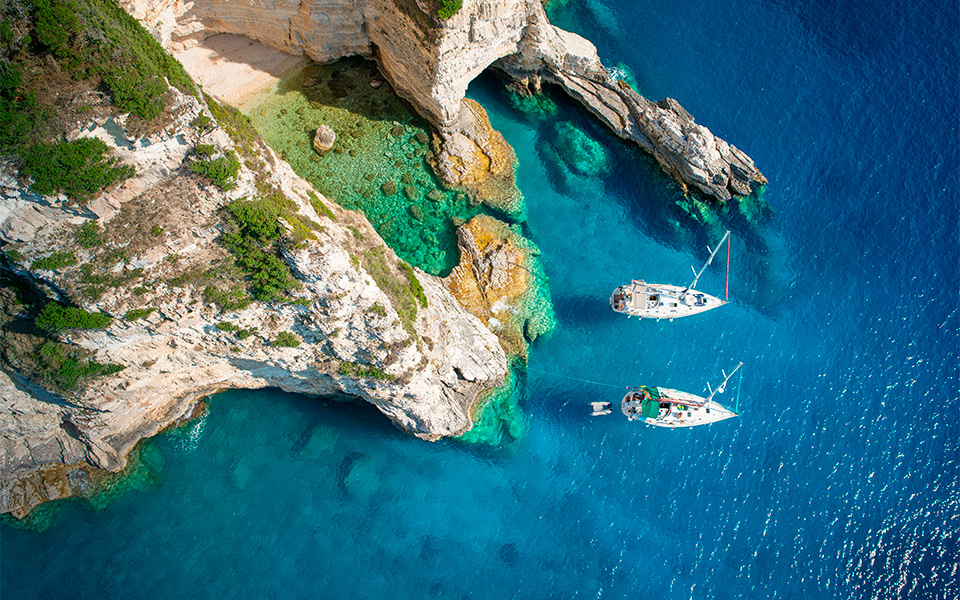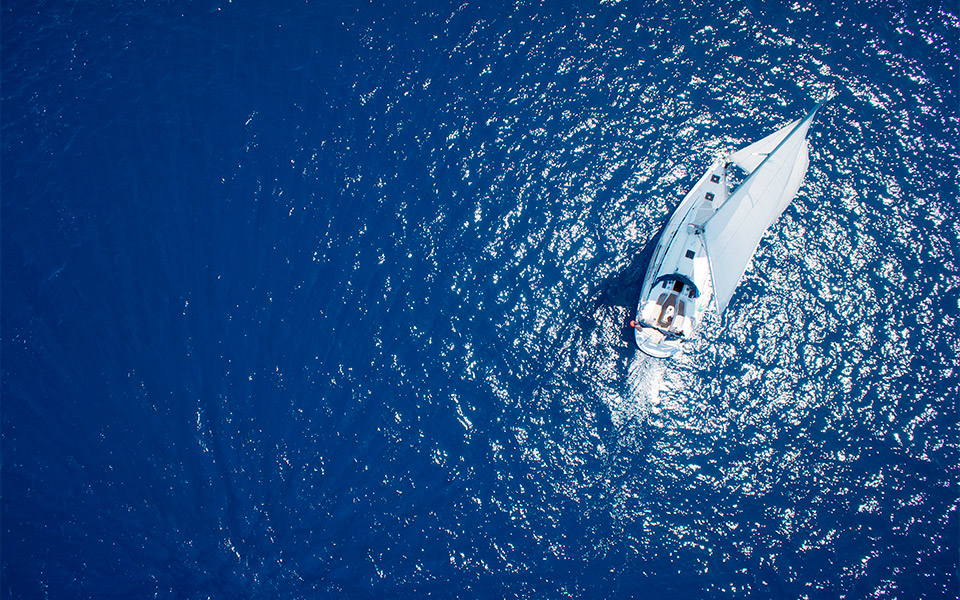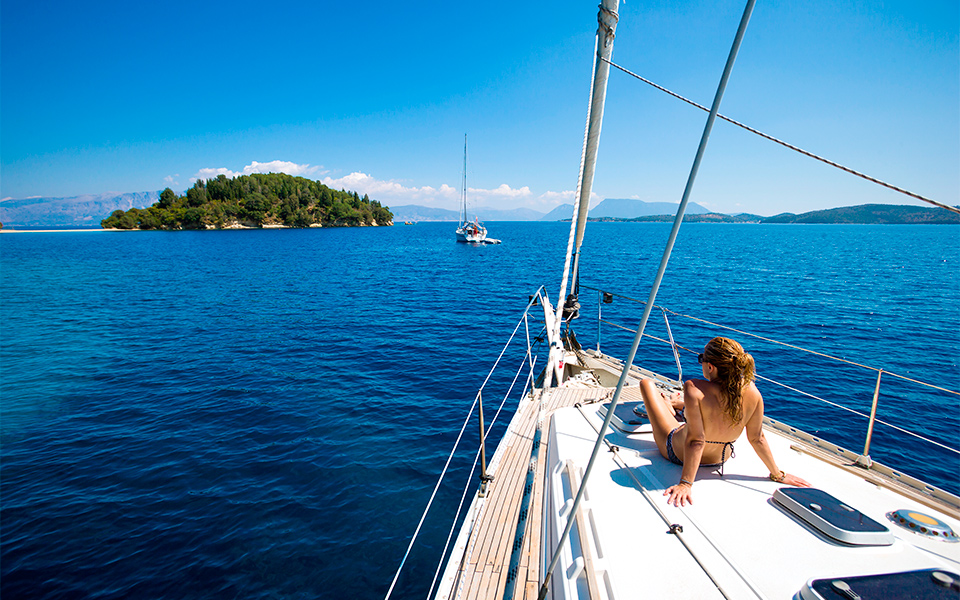The Neoclassical Marvels of Syros: Bridging History and...
While some historic buildings teeter on...

© Shutterstock
It was 1661 when King Charles II took to sailing on the Thames River purely for recreational purposes, establishing the activity as a leisure pursuit as opposed to simply a mode of transport. Vacationing on a yacht has long been associated with a life of luxury, wealth and power. But in the past decade the price of such holidays have dropped significantly, making what was once an activity for the few, far more accessible.
In Greece from May onwards, hundreds of boats and yachts sail the Aegean, offering vacations with an unparalleled sense of freedom and connection with nature.
The Greek archipelago is a particularly attractive playground for novice and experienced sailors alike, with countless secret coves and beaches that are only accessible by boat. Additionally, a chartered yacht can be a floating base for many other summer activities such as fishing, diving and windsurfing. And when you get tired of the sea and want to get your feet back on dry land, all you need to do is point your boat in the direction of the nearest bay or harbor. Avoiding the crowds and the hassle of long ferryboat rides are among the great advantages of vacationing by sailboat.

© Shutterstock
There are dozens of boat chartering companies offering sailing yachts of every category and type, with prices depending on the season, the size of the boat, and its features.
The first question to answer when considering a sailing holiday is whether you want/need a skipper. If so, the chartering company will provide you with a captain to guide your vessel. On average skippers are paid about 1,000 euros per week, (not including their meals). If you’re wondering whether you’re up for sharing a confined space with a stranger, bear in mind that professional skippers are trained to keep a low profile.
The other option is ‘bare boat’ traveling which means that at least one of the passengers must be certified with an RYA Day Skipper International Certificate of Competence (ICC) or an equivalent license from a registered open-water sailing school. If you have received your license from a sailing school outside the European Union, bear in mind that you will have to have it translated / certified.
To charter a boat without a skipper you need to have the appropriate level of experience for your choice of destination. The Saronic Gulf, Ionian islands, Sporades and Haldiki are paradises for bare-boat voyages as the winds tend to be relatively light and the seas calm. In contrast, to head to the Cyclades and Southern Aegean requires far more experience, as the summer meltemi winds in the region regularly reach strengths of 5 to 7 Beaufort (and often more). Unless you are a hardened sailor it can be a harrowing experience – less perfectly delightful and more Perfect Storm.
Bear in mind that in deciding whether to hire a skipper or not, your level of sailing knowledge is not the sole criteria. Skippers also bring the benefit of their detailed local knowledge, guiding you to the best beaches, coves and harbors depending on the weather, and that can make the difference between having a good holiday and a phenomenal one. Having a skipper on board also takes the pressure off you and your companions, allowing you to relax. So if your budget allows it, seriously consider putting your boat in the hands of a professional skipper.
In any event, before you set off you will be asked to pay a deposit upfront that will be returned to you after your trip, provided there is no damage.
Finally, if your boat does not come with a tender, consider requesting one. It will come in handy when you drop anchor in a bay and want to head to the beach to explore (or eat at a taverna). They can also be taken on short-range fishing expeditions.

© Shutterstock
Costs vary according to the type of boat, its size and the season. Just like hotels, seasons are divided into periods of low, medium and high demand.
“As a benchmark, to rent a 36-38 ft sailboat, fully equipped with 3 cabins and 2 bathrooms, the cost during high season will come to 2.000 euros per week. The peak season lasts from the end of July to the beginning of September. That means that each passenger would pay roughly 60 euros per day, which is roughly equivalent to the price of an average hotel room on a popular Greek island,” Bogiatzoglou says.
That price does not include the cost of fuel (which can reach 150-200 euros per week depending on the journey), or harbor fees. However the latter are usually negligible as the majority of Greek harbors are municipally owned and charge about 3 euros per day.
Given that all charter boats come with well-equipped kitchens, if you stock up well, you can cook all of your meals on board, meaning that costs for eating can be kept low.
Towels and sheets are offered by the company renting the boat, but renters are responsible for washing and cleaning. The skipper may help out, but it is not strictly part of his job. “Generally sailing holidays are like going on a holiday in an RV. Usually people who rent sailboats are the type of people who like camping – that is, people who like being close to nature and are happy to put up with some minor hardships such as the restricted space, fewer comforts and using water sparingly,” Bogiatzoglou says.
The last is a key point not to be forgotten on your trip. You only have whatever fresh water is in your tanks and so need to be careful not to waste it – particularly when taking showers. That said, water supplies can always be replenished at harbors and marinas.

© Shutterstock
“Most people who come to rent boats ask to go to Mykonos and Santorini. However that is a trip that is not recommended as it requires 8 hours of sailing per day,” Bogiatzoglou warns. “Whatever itinerary one has, it is highly unlikely to pan out exactly as you imagine it because the weather can change everything. The only givens are when you will set off and when you will return – everything else is pleasantly fluid. The question that the group needs to settle before the trip is ‘how many days do we want to sail per day?’ Only after everyone has agreed can destinations be chosen.”
For those who would rather avoid long sea voyages, there is always the option of renting a sailing boat in the area you want to visit, as opposed to sailing out of Athens. One can travel first by conventional methods to the Cyclades, Dodecanese, Sporades or Ionian, and charter a boat from an island marina.
Boats are confined spaces, and the line between an amazing trip and one marred by frustrations and squabbles is a fine one. To best enjoy the journey it is crucial to split up the tasks that need to be done when on board. Try to divide up jobs based on people’s expertise and ability (eg don’t task the person who gets seasick easily with making lunch below deck) and make sure to inform any novice sailors about what to expect.
Above all, the secret to a good trip is a good group dynamic. Often 6-8 people will be living together on a boat that is only 40ft long, meaning that space and privacy are limited. Mutual respect and honoring basic ground rules are key to ensuring that the atmosphere on board remains light and pleasant. If you think that a sailing holiday is only a crash test for couples, think again…
One of the best sailing destinations in Greece is the region of the Northern Sporades, a group of small green islands with a multitude of wonderful coves and sandy beaches in the northern Aegean off the coast of Pilio.
Visit the three main islands of Skiathos, Skopelos and Alonissos as well as the smaller uninhabited islands of Pelagos, Kyra Panaghia, Peristera, Skantzoura, Giaoura, Piperi and Psathoura.
The northeastern end of the island group is protected as a National Marine Park, and is a habitat and breeding ground for the rare Mediterranean Monk seal.
Alternatively from the marina of Alimos in Athens set sail for the islands of the Saronic Gulf which also usually have easy sailing conditions in the summer, with stops in Aegina, Poros, Hydra, Methana and Spetses.
For those committed to the Cyclades it is better to restrict the number of islands on your itinerary to reduce the amount of time spent traveling. One popular route is Kea, Syros, Mykonos, Kythnos. The more experienced can head to the west Cyclades (Kythnos, Serifos, Sifnos and Milos),
With a sailboat you also can visit pristine beaches that are difficult to reach by land, such as Kleftiko on Milos, Bisti on Hydra and Kolona on Kythnos.
While some historic buildings teeter on...
Patmos Aktis, Resort & Spa combines...
Experience Spetses in its most enchanting...
On the Greek island of Hydra,...